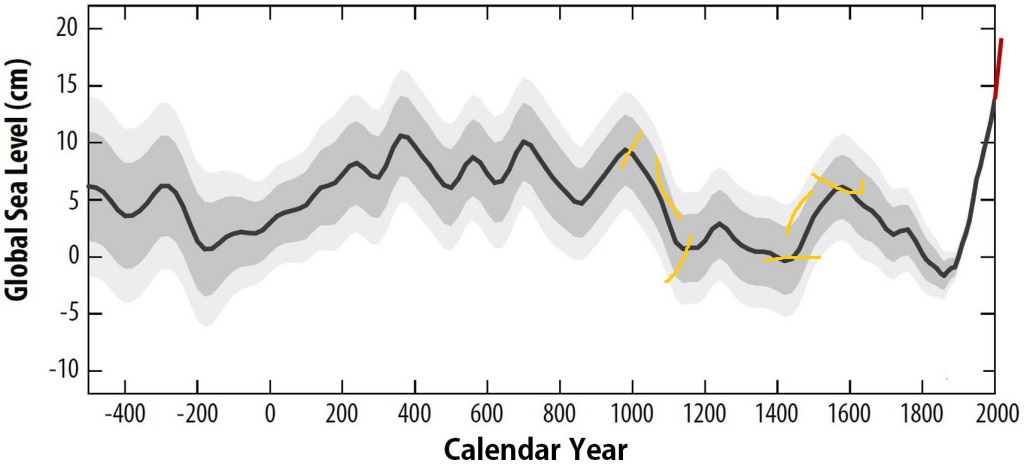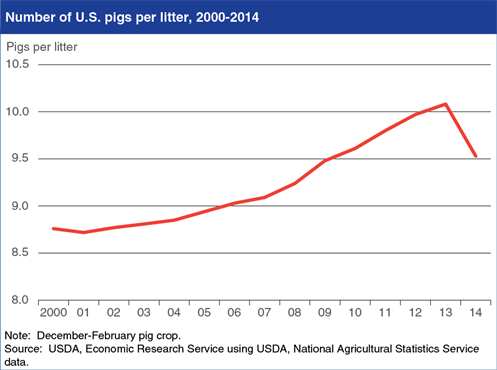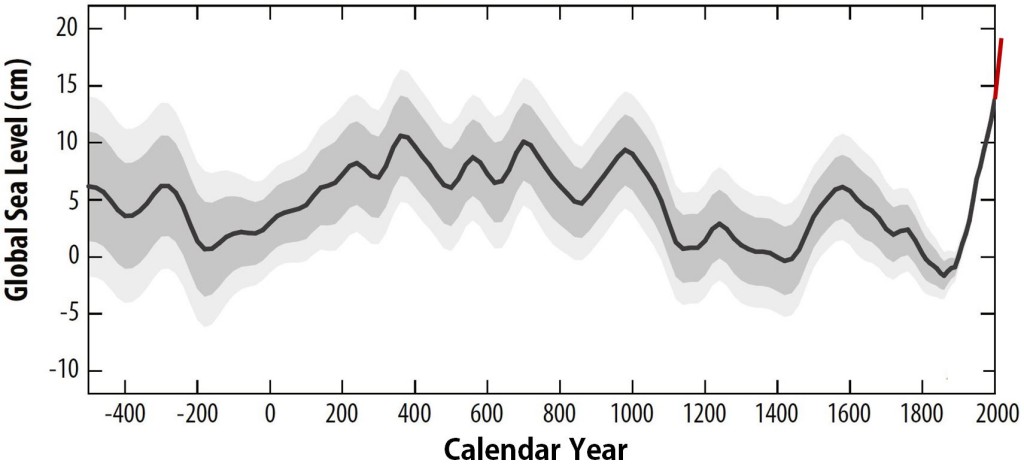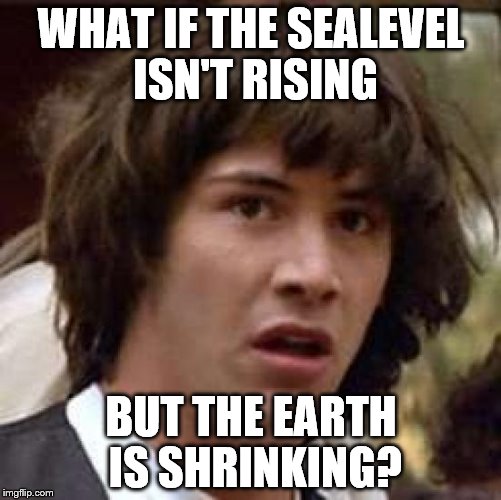It looks like you're using an Ad Blocker.
Please white-list or disable AboveTopSecret.com in your ad-blocking tool.
Thank you.
Some features of ATS will be disabled while you continue to use an ad-blocker.
share:
originally posted by: Krazysh0t
originally posted by: network dude
a reply to: Krazysh0t
but your information is DRASTICALLY different then mine. Why is that? I thought we were both looking at sea level rise for the planet Earth right?
Look at my chart. The rise looks very steady. Then look at yours. It almost looks as if it happens overnight. Now one of us is dishonest here. Would you agree?
Actually no, the tail end of your graph has a steep line. You know, this graph is also located at your source:
Yes, it is. and if we look at that graph, we notice some other oddities.

It seems that in the past, long before we fired up our first gasoline engine, we had a sharp decline, then a sharp increase, and the increase looks almost as sharp as the one we see currently. How on earth is that possible with no AGW? Could it be a cycle that the Earth was going through?
The point is, your OP seems to portray this as a once in a lifetime event, when in fact, it's not.
My position has changed over the years, but I still hold pretty tight to the idea that we really don't know very much about all this, compared to what we really need to know in order to make informed decisions. And fear mongering to push a point sure as # doesn't help very much.
The facts remain the facts and can be viewed by all.
a reply to: Krazysh0t
Well the paper from your op makes no attempt in detailing whether they have factored out the phenomena that affects tidal gauge records beyond normal sea rise so one would have to assume they have not factored it.
I'm not saying there isn't a rise in sea level, all data proves that it's conclusive that the sea levels are rising but I'm just wondering if the rises as drastic in this paper can be attributed solely to human causation as it is claiming when there are many natural occurrences that affect sea levels when it comes tide gauge records.
Well the paper from your op makes no attempt in detailing whether they have factored out the phenomena that affects tidal gauge records beyond normal sea rise so one would have to assume they have not factored it.
I'm not saying there isn't a rise in sea level, all data proves that it's conclusive that the sea levels are rising but I'm just wondering if the rises as drastic in this paper can be attributed solely to human causation as it is claiming when there are many natural occurrences that affect sea levels when it comes tide gauge records.
originally posted by: network dude
Yes, it is. and if we look at that graph, we notice some other oddities.
It seems that in the past, long before we fired up our first gasoline engine, we had a sharp decline, then a sharp increase, and the increase looks almost as sharp as the one we see currently. How on earth is that possible with no AGW? Could it be a cycle that the Earth was going through?
How can you reasonably say what the rates of change of various parts of graphs are just by eyeballing it? You don't know what those derivatives are and pretending like you do is dishonest.
The point is, your OP seems to portray this as a once in a lifetime event, when in fact, it's not.
The point is that is some terrible graph interpretation you are doing there.
My position has changed over the years, but I still hold pretty tight to the idea that we really don't know very much about all this, compared to what we really need to know in order to make informed decisions. And fear mongering to push a point sure as # doesn't help very much.
The facts remain the facts and can be viewed by all.
Every scientific field of study there is more that is unknown than we do know. That is just stating the obvious.
a reply to: Krazysh0t
I saw a programme where they were showing some of the tropical islands where the sea level has risen dangerously so you are right the sea level is having an effect on people's lives, albeit it could take decades before cities are affected. I know we are getting more flooding in the UK especially on our low lying areas and the eastern coast is slipping quietly into the sea in parts of high erosion.
It isn't only the sea shores its anywhere where land is below sea level that is under threat.
Ironically another reason some will be having to move from their homes is because of draught and I do wonder if any world authority is looking at the overall picture on water levels etc etc for the next 20 - 50 years much of this era we will live through.
I saw a programme where they were showing some of the tropical islands where the sea level has risen dangerously so you are right the sea level is having an effect on people's lives, albeit it could take decades before cities are affected. I know we are getting more flooding in the UK especially on our low lying areas and the eastern coast is slipping quietly into the sea in parts of high erosion.
It isn't only the sea shores its anywhere where land is below sea level that is under threat.
Ironically another reason some will be having to move from their homes is because of draught and I do wonder if any world authority is looking at the overall picture on water levels etc etc for the next 20 - 50 years much of this era we will live through.
a reply to: Discotech
I'm having a bit of trouble deciphering this science speak, but it appears that they making sure their data aligns to multiple sources and that they are averaging the numbers to account for what you linked earlier.
Tide gauge records were drawn from the Permanent Service for Mean Sea Level (PSMSL) (93, 94). We included all records that were either (i) longer than 150 y, (ii) within 5 degrees distance of a proxy site and longer than 70 y, or (iii) the nearest tide gauge to a proxy site that is longer than 20 y (Dataset S1, b). We complement these with multicentury records from Amsterdam (1700–1925 CE) (11), Kronstadt (1773–1993 CE) (95), and Stockholm (1774–2000 CE) (96), as compiled by PSMSL. Annual tide-gauge data were smoothed by fitting a temporal GP model to each record and then transforming the fitted model to decadal averages, both for computational efficiency and because the decadal averages more accurately reflect the recording capabilities of proxy records.
To incorporate information from a broader set of tide-gauge records, we also included decadal averages from the Kalman smoother-estimated GSL for 1880–2010 CE of ref. 12. Off-diagonal elements of the GSL covariance matrix were derived from an exponential decay function with a 3-y decorrelation timescale. This timescale was set based on the mean temporal correlation coefficient across all tide gauges using the annual PSMSL data, which approaches zero after 2 y.
I'm having a bit of trouble deciphering this science speak, but it appears that they making sure their data aligns to multiple sources and that they are averaging the numbers to account for what you linked earlier.
originally posted by: Krazysh0t
How can you reasonably say what the rates of change of various parts of graphs are just by eyeballing it? You don't know what those derivatives are and pretending like you do is dishonest.
Go back and look at your OP. You used a #ing chart. Do you know what charts are for?
I'll give you a hint. (visual representation of data)
and you whine about strawmen.
originally posted by: gmoneystunt
a reply to: Krazysh0t
To you does global warming and climate change mean the same?
global warming
an increase in the earth's average atmospheric temperature that causes corresponding changes in climate and that may result from the greenhouse effect.
climate change
a long-term change in the earth's climate, especially a change due to an increase in the average atmospheric temperature:
Could a radiation leak into the oceans cause warming?
Maybe, depends on how much radiation I guess.
Could polar shift be a contributing factor to rising sea levels?
Maybe.
originally posted by: Ericthedoubter
a reply to: Krazysh0t
I'd like to correct you on one point.
This world is far from cramped.I believe I read somewhere that the entire worlds' population would fit in the state of Texas with room to spare.
I don't know if that's true but our world is VAST and mostly empty.
Because most of the uninhabited world is uninhabitable. Thats why rivers and ocean front are so 'popular'. Temperate zones are more appealing.
Unless you want to live on ocean, in Desert, under jungle canopy or on frozen Poles. That factoid about Texas is 'standing room only'.
a reply to: Krazysh0t
It is impossible for man to have influenced the shift of the magnetic north, the intrusion of the new planet into our solar system, or the CMEs and solar activities affecting our Earth.
Where is Earth in its 26,000 siderial period? The sidereal period (period when mean solar days are 365.256 in which each Earth day is about 20 minutes longer because of the precession of the Earth's spin , the vernal equinox pressure period also is a factor to interject.. The fact that the year is not exactly 365 days, periods in which the warmer season are longer, and the cycle of the sun should be known before pointing finger at man for warming the Earth.
We are not responsible for "global warming"which leads to polar ice ,
melting and sea levels rising. I admit, however, we don't do enough to care for our planet.
Every other planet in our solar system that we know of are also heating up.
Mars Warming
It is impossible for man to have influenced the shift of the magnetic north, the intrusion of the new planet into our solar system, or the CMEs and solar activities affecting our Earth.
Where is Earth in its 26,000 siderial period? The sidereal period (period when mean solar days are 365.256 in which each Earth day is about 20 minutes longer because of the precession of the Earth's spin , the vernal equinox pressure period also is a factor to interject.. The fact that the year is not exactly 365 days, periods in which the warmer season are longer, and the cycle of the sun should be known before pointing finger at man for warming the Earth.
We are not responsible for "global warming"which leads to polar ice ,
melting and sea levels rising. I admit, however, we don't do enough to care for our planet.
Every other planet in our solar system that we know of are also heating up.
Earth is currently experiencing rapid warming, which the vast majority of climate scientists says is due to humans pumping huge amounts of greenhouse gases into the atmosphere.
Mars, too, appears to be enjoying more mild and balmy temperatures.
In 2005 data from NASA's Mars Global Surveyor and Odyssey missions revealed that the carbon dioxide "ice caps" near Mars's south pole had been diminishing for three summers in a row.
Habibullo Abdussamatov, head of space research at St. Petersburg's Pulkovo Astronomical Observatory in Russia, says the Mars data is evidence that the current global warming on Earth is being caused by changes in the sun.
"The long-term increase in solar irradiance is heating both Earth and Mars," he said.
Mars Warming
a reply to: Krazysh0t
The opening of the thread you said
Then when I showed you the debatable thread you said
Then I asked
You showed a clear difference below which I appreciate
global warming
climate change
So now I am left confused Are you blaming the sea level rise on global warming, climate change or both?
The opening of the thread you said
Oh btw, yes this sea level rise has been directly correlated to global warming.
Then when I showed you the debatable thread you said
Basically it is saying that if Antarctica isn't contributing to the sea rise, then something else is. Climate change
Then I asked
originally posted by: gmoneystunt
a reply to: Krazysh0t
To you does global warming and climate change mean the same?
You showed a clear difference below which I appreciate
global warming
an increase in the earth's average atmospheric temperature that causes corresponding changes in climate and that may result from the greenhouse effect.
climate change
a long-term change in the earth's climate, especially a change due to an increase in the average atmospheric temperature:
So now I am left confused Are you blaming the sea level rise on global warming, climate change or both?
a reply to: gmoneystunt
Oh I see what you are getting at. I have a tendency to use those terms interchangably. It's kind of lazy on my part, but many people don't seem to know the differences between those terms anyways or if they do don't seem to care. You are the first to ever point this out to me.
Oh I see what you are getting at. I have a tendency to use those terms interchangably. It's kind of lazy on my part, but many people don't seem to know the differences between those terms anyways or if they do don't seem to care. You are the first to ever point this out to me.
Just need to change the process a weeee little bit...
Instead of 'The Sky is Falling', have Chicken Little run about shouting, 'The Water is Rising, The Water is Rising!'
There now, that seems a good fit
...
Instead of 'The Sky is Falling', have Chicken Little run about shouting, 'The Water is Rising, The Water is Rising!'
There now, that seems a good fit
...
a reply to: Krazysh0t
If I created this thread I think I would had went along the lines of, the sea level rise is attributed to possibly climate change and other possible factors such as polar shift or radiation. I still think you are attributing this to global warming such as the opening of your thread. The contradiction of global warming is blaming CO2 levels warming the atmosphere even though a NASA report verifies carbon dioxide actually cools the atmosphere.
If I created this thread I think I would had went along the lines of, the sea level rise is attributed to possibly climate change and other possible factors such as polar shift or radiation. I still think you are attributing this to global warming such as the opening of your thread. The contradiction of global warming is blaming CO2 levels warming the atmosphere even though a NASA report verifies carbon dioxide actually cools the atmosphere.
edit on 23-2-2016 by gmoneystunt because: (no reason given)
a reply to: gmoneystunt
Well of course I am attributing it to global warming. So are the scientists in the study.
What? Prove it.
Well of course I am attributing it to global warming. So are the scientists in the study.
The scientists reported in a paper published Monday in Proceedings of the National Academy of Sciences that they have greater than 95 percent certainty that at least half of more than 5 inches of sea level rise they detected during the 20th century was directly caused by global warming.
The contradiction of global warming is CO2 levels even though a NASA report verifies carbon dioxide actually cools atmosphere.
What? Prove it.
Sea levels rapidly rising?
Thats just one of the Earths ways of fighting back.
I mean Florida... come on...
Thats just one of the Earths ways of fighting back.
I mean Florida... come on...
edit on 23-2-2016 by EmmanuelGoldstein because: (no reason given)
originally posted by: Krazysh0t
originally posted by: gspat
originally posted by: Krazysh0t
or even existed longer than 2800 years ago
That part does it...
Nothing to strawman.
Get simple basic well acknowledged facts right first.
I never said humans didn't exist outside of 2800 years for the SECOND time. Stop strawmanning me.
What that line meant (and within context since you took it out of context there) was that human civilization either wasn't as wide spread as it was now OR it didn't exist at all. Timeframes greater than 2800 years ago encompass QUITE a bit of Earth's history you know? Reading comprehension (and apparently Boolean logic) is your friend.
You stated what you stated with a deliberate purpose in mind, to state that humans and only humans cause whatever shtf moment you want to bring forward. In this case sea levels...
Nice to see your graph is fairly short... It makes the "Hockey Stick" effect you want to emphasize stand out nicely.
Do you know the speed of sea level rise during any time frame before the span your graph shows? Or does that context not matter because it doesn't help you and your thread?
please go ahead, strawman me again...
Sea level rise average is about 7 in/century. This doesn't seem much past that and seeing as how it's bound to fluctuate anyways, more or less seems to be as expected.
And then there is this data, which shows that pig production, primarily for bacon, uses more water to keep the pigs hydrated.
It seems to claim that the pigs' constant flow of urine is causing sea levels to rise.

article
Leading scientists agree that this problem can be easily solved if we quit producing and consuming bacon.
It seems to claim that the pigs' constant flow of urine is causing sea levels to rise.

article
Leading scientists agree that this problem can be easily solved if we quit producing and consuming bacon.
new topics
-
'Proud Prophet' 12 Day Exercise Predicted Global Nuclear Catastrophe
World War Three: 4 hours ago -
Never say Never?
Science & Technology: 7 hours ago
top topics
-
Lies lies lies, green energy is black.
The Gray Area: 14 hours ago, 11 flags -
Never say Never?
Science & Technology: 7 hours ago, 8 flags -
'Proud Prophet' 12 Day Exercise Predicted Global Nuclear Catastrophe
World War Three: 4 hours ago, 3 flags
active topics
-
Biden pardons his son Hunter despite previous pledges not to
Mainstream News • 99 • : marg6043 -
Never say Never?
Science & Technology • 24 • : Flyingclaydisk -
President-Elect Trump Picks Indian-American KASHYAP P. PATEL for F.B.I. Director.
2024 Elections • 48 • : WeMustCare -
President-Elect DONALD TRUMP's 2nd-Term Administration Takes Shape.
Political Ideology • 267 • : WeMustCare -
Ford Motor Company sold to Elon Musk
Ludicrous Online Lies • 10 • : YouCanCallMeAl -
Lies lies lies, green energy is black.
The Gray Area • 25 • : CriticalStinker -
The Final Experiment is Scheduled for December 2024. Will it Finally Answer the Question?
Science & Technology • 26 • : Arbitrageur -
Mass UAP events. DC. Machester Airport, UFOs over sub base in CT, Nuke bases.
Aliens and UFOs • 51 • : WeMustCare -
'Proud Prophet' 12 Day Exercise Predicted Global Nuclear Catastrophe
World War Three • 10 • : TheValeyard -
The Reactionary Conspiracy 13. The plot’s theology.
General Conspiracies • 319 • : andy06shake


